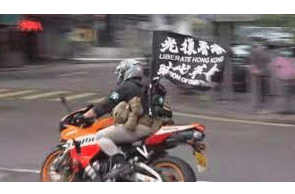Here’s the introduction to a must read round up by Lawfare
Tong Ying-kit is virtually unknown outside of Hong Kong, but his case may mark an ominous turning point for human rights and rule of law in the former British colony. A High Court judge ruled on May 20 that Tong was not entitled to a jury trial in his pending National Security Law (NSL) terrorism case; instead, his case would be handled by a three-judge panel. The ruling marked a small but significant step backward for the rule of law in Hong Kong and is part of a larger trend of efforts by the Hong Kong government to dilute key due process rights in NSL cases.
Tong, 24, was arrested on July 1, 2020, after riding his motorcycle into a group of police officers during a pro-democracy protest on the 23rd anniversary of Hong Kong’s reversion to Chinese sovereignty. He was quickly charged with terrorism under the then brand-new National Security Law. He was also charged with the NSL crime of inciting secession because he was carrying a banner that the government deemed pro-independence. Additionally, Tong faces charges of “causing grievous bodily harm by dangerous driving” under the Road Traffic Ordinance. His trial will begin in June before Hong Kong’s High Court.
The NSL was drafted and passed by Beijing primarily to deal with key pro-democracy leaders like Jimmy Lai and Joshua Wong, both of whom have been charged under the NSL and are behind bars awaiting trial. Their high-profile political activities—and especially their advocacy in places like London, Washington and Brussels—have long irked Beijing. And yet, perhaps because his case involves an alleged act of violence, Tong’s case will be tried first.
The NSL gives Beijing a number of new tools to crack down on its perceived political enemies in Hong Kong. The law’s vague and overbroad criminal provisions have been used to target peaceful protesters and Hong Kong’s political opposition, while other provisions have been used to tighten Beijing’s control over Hong Kong’s government bureaucracy and its education system. But it also creates a new dilemma: how to ensure that Hong Kong’s world-class judiciary, justly famous for its commitment to the rule of law, will deliver guilty verdicts under the NSL, even when doing so would go against the human rights protections found in the Basic Law, Hong Kong’s mini-constitution? One could argue that cases like Tong’s are better handled outside the NSL. As far as is publicly known, Tong acted alone, and did not engage in the extensive planning and staging that is often a hallmark of acts of terrorist violence elsewhere in the world.
The charge of inciting secession against Tong poses a further dilemma: How can the charge, which seeks to criminally punish Tong merely for carrying an allegedly pro-independence banner, be reconciled with the Basic Law’s guarantee of the right to free speech?
More https://www.lawfareblog.com/death-thousand-cuts-chipping-away-due-process-rights-hk-nsl-cases




